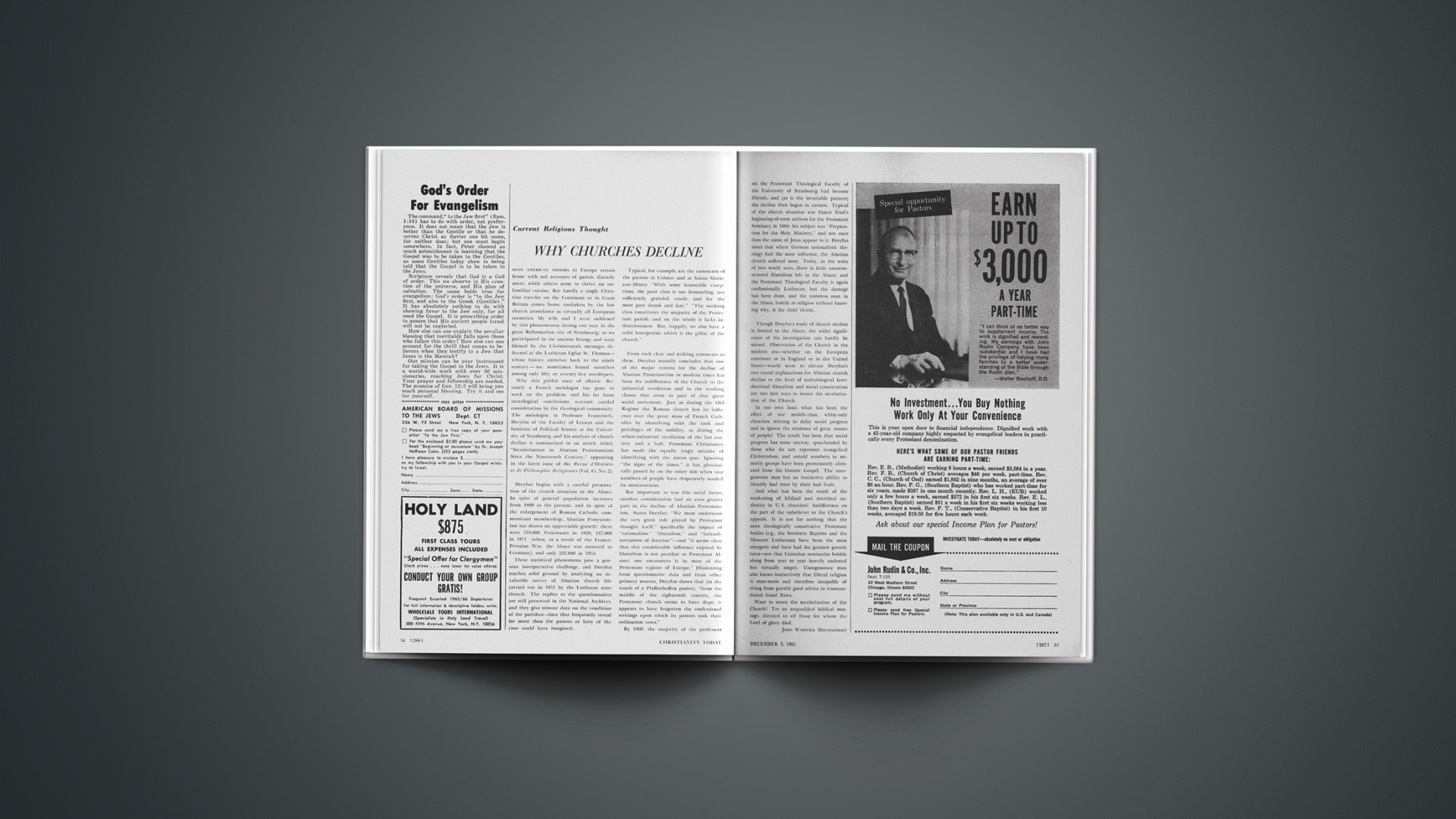Some american visitors to Europe return home with sad accounts of gastric disturbances, while others seem to thrive on unfamiliar cuisine. But hardly a single Christian traveler on the Continent or in Great Britain comes home unshaken by the low church attendance in virtually all European countries. My wife and I were saddened by this phenomenon during our year in the great Reformation city of Strasbourg; as we participated in the ancient liturgy and were blessed by the Christocentric messages delivered at the Lutheran Eglise St. Thomas—whose history stretches back to the ninth century—we sometimes found ourselves among only fifty or seventy-five worshipers.
Why this pitiful stale of affairs? Recently a French sociologist has gone to work on the problem, and his far from tautological conclusions warrant careful consideration by the theological community. The sociologist is Professor François-G. Dreyfus of the Faculty of Letters and the Institute of Political Science at the University of Strasbourg, and his analysis of church decline is summarized in an article titled, “Secularization in Alsatian Protestantism Since the Nineteenth Century,” appearing in the latest issue of the Revue d’Histoire el de Philosophie Religieuses (Vol. 45, No. 2).
Dreyfus begins with a careful presentation of the church situation in the Alsace. In spite of general population increases from 1800 to the present, and in spite of the enlargement of Roman Catholic communicant membership, Alsatian Protestantism has shown no appreciable growth: there were 210,000 Protestants in 1820,247,000 in 1871 (when, as a result of the Franco-Prussian War, the Alsace was annexed to Germany), and only 242,000 in 1954.
These statistical phenomena pose a genuine interpretative challenge, and Dreyfus reaches solid ground by analyzing an invaluable survey of Alsatian church life carried out in 1851 by the Lutheran state church. The replies to the questionnaires are still preserved in the National Archives, and they give minute data on the condition of the parishes—data that frequently reveal far more than the pastors or laity of the time could have imagined.
Typical, for example, are the comments of the pastors at Colmar and at Sainte-Marie-aux-Mines: “With some honorable exceptions, the poor class is too demanding, not sufficiently grateful, crude, and for the most part drunk and lazy.” “The working class constitutes the majority of the Protestant parish, and on the whole it lacks industriousness. But, happily, we also have a solid bourgeoisie which is the pillar of the church.”
From such clear and striking comments as these, Dreyfus soundly concludes that one of the major reasons for the decline of Alsatian Protestantism in modern times has been the indifference of the Church to the industrial revolution and to the working classes that arose as part of that great social movement. Just as during the Old Regime the Roman church lost its influence over the great mass of French Catholics by identifying with the rank and privileges of the nobility, so during the urban-industrial revolution of the last century and a half, Protestant Christianity has made the equally tragic mistake of identifying with the status quo. Ignoring “the signs of the times,” it has pharisaically passed by on the other side when vast numbers of people have desperately needed its ministrations.
But important as was this social factor, another consideration had an even greater part in the decline of Alsatian Protestantism. States Dreyfus: “We must underscore the very great role played by Protestant thought itself,” specifically the impact of “rationalism,” “liberalism,” and “latitudinarianism of doctrine”—and “it seems clear that this considerable influence enjoyed by liberalism is not peculiar to Protestant Alsace; one encounters it in most of the Protestant regions of Europe.” Illustrating from questionnaire data and from other primary sources, Dreyfus shows that (in the words of a Pfaffenhoffen pastor), “from the middle of the eighteenth century, the Protestant church seems to have slept; it appears to have forgotten the confessional writings upon which its pastors took their ordination vows.”
By 1860, the majority of the professors on the Protestant Theological Faculty of the University of Strasbourg had become liberals, and (as is the invariable pattern) the decline then began in earnest. Typical of the church situation was Pastor Nied’s beginning-of-term address for the Protestant Seminary in 1868; his subject was “Preparation for the Holy Ministry,” and not once does the name of Jesus appear in it. Dreyfus notes that where German rationalistic theology had the most influence, the Alsatian church suffered most. Today, in the wake of two world wars, there is little unreconstructed liberalism left in the Alsace, and the Protestant Theological Faculty is again confessionally Lutheran; but the damage has been done, and the common man in the Alsace, hostile to religion without knowing why, is the chief victim.
Though Dreyfus’s study of church decline is limited to the Alsace, the wider significance of his investigation can hardly be missed. Observation of the Church in the modern era—whether on the European continent or in England or in the United States—would seem to elevate Dreyfus’s two causal explanations for Alsatian church decline to the level of ecclesiological laws: doctrinal liberalism and social conservatism are two best ways to insure the secularization of the Church.
In our own land, what has been the effect of our middle-class, white-only churches, striving to delay social progress and to ignore the existence of great masses of people? The result has been that social progress has come anyway, spearheaded by those who do not represent evangelical Christendom, and untold numbers in minority groups have been permanently alienated from the historic Gospel. The unregenerate man has an instinctive ability to identify bad trees by their bad fruit.
And what has been the result of the weakening of biblical and doctrinal authority in U. S. churches? Indifference on the part of the unbeliever to the Church’s appeals. It is not for nothing that the most theologically conservative Protestant bodies (e.g., the Southern Baptists and the Missouri Lutherans) have been the most energetic and have had the greatest growth rates—nor that Unitarian seminaries hobble along from year to year heavily endowed but virtually empty. Unregenerate man also knows instinctively that liberal religion is man-made and therefore incapable of rising from puerile good advice to transcendental Good News.
Want to arrest the secularization of the Church? Try an unqualified biblical message, directed to all those for whom the Lord of glory died.










